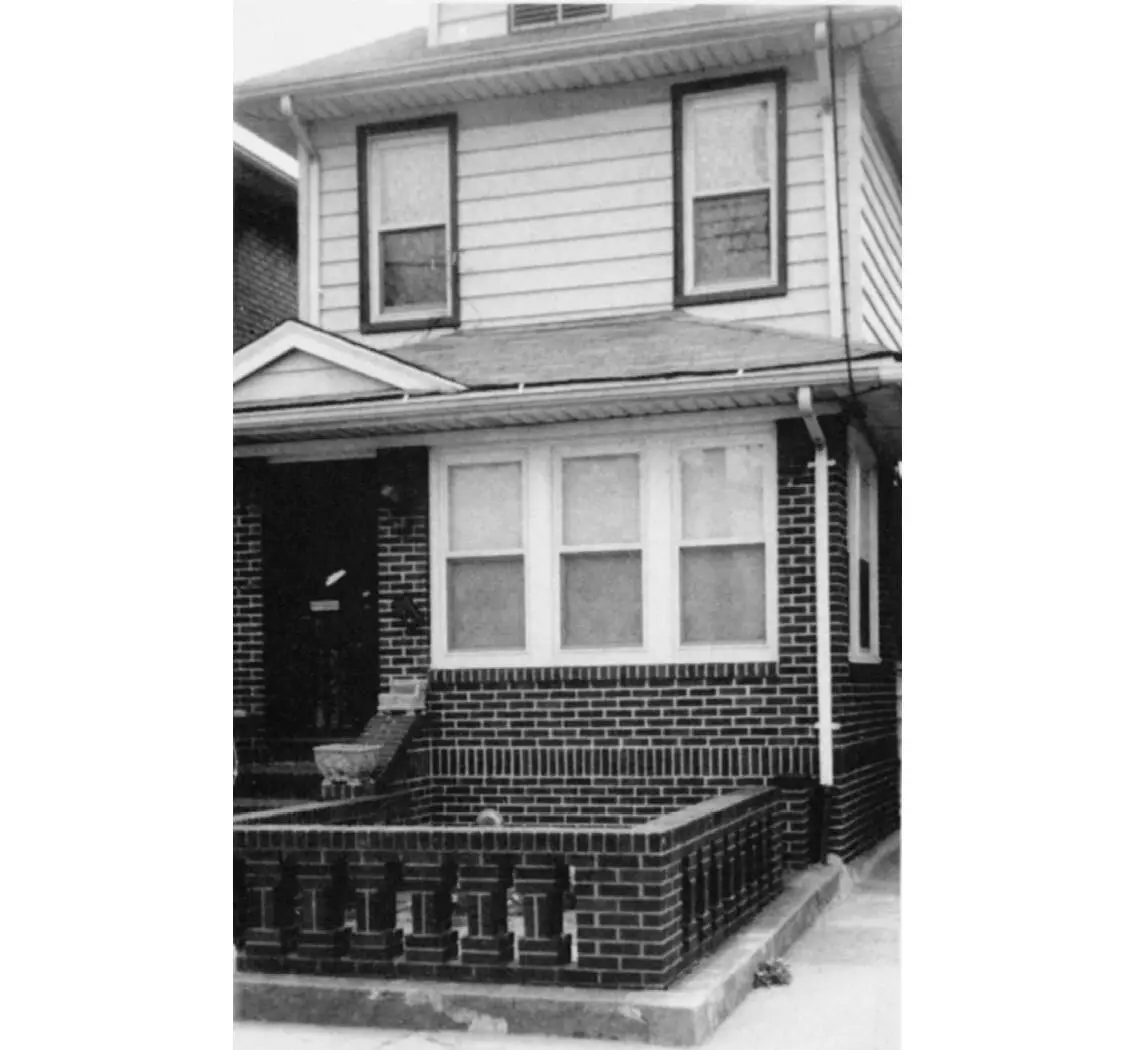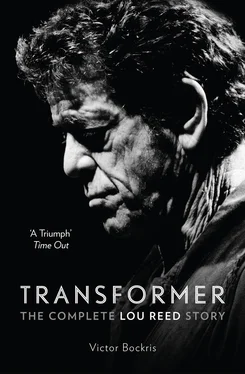At the end of the eight-week treatment, Lou was put on strong tranquilizing medication. “I HATE PSYCHIATRISTS. I HATE PSYCHIATRISTS. I HATE PSYCHIATRISTS,” he would later write in one of his best poems, “People Must Have to Die for the Music.” But in his heart he felt betrayed. If his parents had really loved him, they would never have allowed the shock treatments.
***
Lewis Alan Reed was born on March 2, 1942, at Beth El Hospital in Brooklyn, New York. His father, Sidney George Reed, a diminutive, black-haired man who had changed his name from Rabinowitz, was a tax accountant. His mother, Toby Futterman Reed, seven years younger than her husband, a former beauty queen, was a housewife. Both parents were native New Yorkers who in a decade would move to the upper-middle class of Freeport, Long Island. Lewis developed into a small, thin child with kinky black hair, buck teeth, and a sensitive, nervous disposition. By that time, his mother, the model of a Jewish mother, had shaped her beauty-queen personality into an extremely nice, polite, formal persona that Lou later criticized in “Standing On Ceremony” (“a song I wrote for my mother”). She wanted her son to have the best opportunities in life and dreamed that one day he would become a doctor or a lawyer.

The house in Brooklyn where Lou was born. (Victor Bockris)
The emotional milieu that dominated Lewis’s life throughout his childhood was a kind of suffocating love. “Gentiles don’t understand about Jewish love,” wrote Albert Goldman in his biography of one of Lewis’s role models, Lenny Bruce. “They can’t grasp a positive, affectionate emotion that is so crossed with negative impulses, so qualified with antagonistic feelings that it teeters at every second on a fulcrum of ambivalence. Jewish love is love, all right, but it’s mingled with such a big slug of pity, cut with so much condescension, embittered with so much tacit disapproval, disapprobation, even disgust, that when you are the object of this love, you might as well be an object of hate. Jewish love made Kafka feel like a cockroach …”
In the opinion of one family friend, “Lou’s mother had the Jewish-mother syndrome with her first child. They overwatch their first child. The kid says watch me, watch me, watch me. You can’t watch them enough, and they’re never happy, because they’ve spent so much time being watched that’s what they expect. His mother was not off to work every morning, the mothers of this era were full-time mothers. Full-time watchers. They set up a scenario that could never be equaled in later life.”
When Lewis was five, the Reeds had a second child, Elizabeth, affectionately known as Bunny. While Lou doted on his little sister, her arrival was also cause for alarm. His mother’s love had become a trap built around emotional blackmail: first, since the mother’s happiness depends upon the son’s happiness, it becomes a responsibility for the son to be happy. Second, since the mother’s love is all-powerful, it is impossible for the son to return an equal amount of love, therefore he is perennially guilty. Then, with the arrival of the sister, the mother’s love can no longer be total. All three elements combine to put the son in an impossible-to-fulfill situation, making him feel impotent, confused, and angry. The trap is sealed by an inability to talk about such matters so that all the bitter hostility boiling below the surface is carefully contained until the son marries a woman who replaces his mother. Then it explodes in her face.
Goldman could have been describing Reed as much as Bruce when he concluded, “The sons develop into twisted personalities, loving where they should hate and hating where they should love. They attach themselves to women who hurt them and treat with contempt the women who offer them simple love. They often display great talents in their work, but as men they have curiously ineffective characters.”
The Reeds moved from an apartment in Brooklyn to their house in Freeport back in 1953—the year before rock began. Freeport, a town of just under thirty thousand inhabitants at the time, lay on the Atlantic coast, on the Freeport and Middle Bays—protected from the ocean by the thin expanse of Long Beach. The town, one of a thousand spanning the length of Long Island, was designed and operated around the requirements of middle-class families. Though just forty-five minutes from Manhattan by car or train, it could have been a lifetime away from Brooklyn, the city the family had just deserted. In fact, with well-funded parks, beaches, social centres, and schools, Freeport was suburban utopia. Thirty-five Oakfield Avenue, on the corner of Oakfield and Maxon, was a modern single-story house in a middle-class subsection of Freeport called the Village. Most of the houses in the neighborhood were built in colonial or ranch style, but Lewis’s parents owned a house that, in the 1950s, friends referred to as “the chicken coop” because of its modern, angular, single-floor design. Though squat and odd from the outside, it was beautifully laid out and comfortable, furnished in a 1950s modern style. It also had a two-car garage and surrounding lawn perfect for children to play on. In fact, the wide, quiet streets doubled as baseball diamonds and football fields when the local kids got together for a pickup game. Their neighborhood was for the most part upper-middle class and Jewish. The idea of urban Jewish ghettos had become as abhorrent to an increasingly powerful American Jewish population as it was to the continuing wave of European Jewish immigrants. Many Jewish families who had prospered in postwar New York had moved out of the city to similar suburban towns to get away from the last vestiges of the ghetto, and to create for themselves a middle-class life that would Americanize and integrate them. The resulting migration from New York to Long Island created a suburban middle class in which money was equated with stability, and wealth with status and power.
After graduating from Carolyn G. Atkinson Elementary and Freeport Junior High, in the fall of 1956, Lewis and his friends began attending Freeport High School (now replaced by a bunkerlike junior high). A large, stone structure, on the corner of Pine and South Grove, with a carved facade and expanse of lawn, the school resembled a medieval English boarding school like Eton or Rugby. It was a ten-minute walk from Oakfield and Maxon through the tree-lined neighborhood of Freeport Village and just over the busy Sunrise Highway. “I started out in the Brooklyn Public School System,” Lou said, “and have hated all forms of school and authority ever since.”
Lewis was surrounded by children who came from the same social and economic background. His closest friend, Allen Hyman, who used to eat at the Reeds’ all the time and lived only a block and a half away, remembered, “The inside of their house was fifties modern, living room and den. At least from sixth grade on my view of his upbringing was very, very suburban middle class.”
The area has a history of fostering comedians and a particular type of humor. Freeport in the twenties was a clam-digging town with an active Ku Klux Klan and German-American bund in nearby Lindenhurst. In the thirties and forties, it attracted a segment of the East Coast entertainment world, including many vaudeville talents. The vaudevillians brought with them not only their eccentric lifestyles and corny attitudes, but the town’s first blacks, who initially worked as their servants. By the time the Reeds got there, the show people were adding their own artistic bent to the town’s musical heritage. Their immediate neighbours included Leo Carrillo, who played Pancho on the popular TV show The Cisco Kid , as well as Xavier Cugat’s head marimba player and Lassie ’s television mother, June Lockhart. Guylanders (Long Islanders) refuse to be impressed by celebrities, dignitaries, and the airs so dear to Manhattanites. “My main memory of Lou was that he had a tremendous sense of satire,” recalled high-school friend John Shebar. “He had a certain irreverence that was a little out of the ordinary. Mostly he would be making fun of the teacher or doing an impersonation of some ridiculous situation in school.”
Читать дальше













